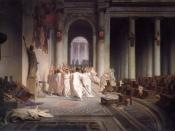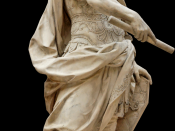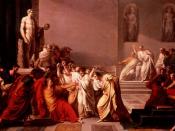Brutus: The Conspiring Aristotelian Hero According to Aristotle, a hero is a man whose misfortune is brought upon him not by vice or corruption, but from an error in judgment. That the change in the hero's fortune must be from happiness to misery and the cause must be from some great error in the hero's judgment. In William Shakespeare's Julius Caesar, Brutus, is argued to be the Aristotelian hero. Brutus makes many egregious errors that creates Brutus's disposition to change from happiness to misery. Brutus is a true Aristotelian hero because of his errors in judgment that has caused his happiness to fall to misery; Brutus's mistakes are when he agrees to join the conspiracy, allows Antony to orate at Caesar's funeral, and he marches to Phillipi.
Brutus's first and worst error is that he let himself get manipulated by Cassius and joined the conspiracy against Caesar. "No, not an oath: if not the face of men,/ The sufferance of our souls, the time's abuse-/ If these motives be weak, break off betimes,/ And every man hence to his idle bed./
So let the high-sighted tyranny rage on/ Till each man drop by lottery" (Shakespeare II, i 122-129). By letting himself be manipulated by Cassius, Brutus gives up his right to think. He lets himself becoma a pawn to Cassius who cleverly uses Brutus to become an example to the other senators. Brutus's joining the conspiracy and allowing himself to trust Cassius leaves him vulnerable. This begins his slow downfall; another fault is when Brutus grants Antony permission to orate at Caesar's funeral.
Antony discovers Caesar dead and realizes that Caesar's friends and confidant are the ones responsible. Obviously he will want to avenge his friend's death, but Brutus, oblivious to the obvious, permits Antony to speak at Caesar's funeral. "You shall, Marc Antony" (Shakespeare, III, i 250). With these brief utterances of words, Brutus has undoubtedly made the most dreadful blunder in his lifetime. To allow Antony to speak, Brutus endangers his reputation and his life in Rome. He conspires against Caesar so that Rome will be a better place, but instead that same Rome turns on him and will drives him out. He becomes known as a traitor and wicked. He loses his best friend for to maintain his idealistic Rome, when this Rome will not stand for him and is actions. He does something out of the goodness of his heart and later realizes that it was all done in vain. Besides him joining a hazardous conspiracy and consenting to Antony's oration, he also goes to fight a hopeless battle in Phillipi.
After being driven out of Rome, Brutus and Cassius go to Phillipi and prepare for a battle with Antony and Octavius. "⦠Marching to Phillipi presently" (Shakespeare IV, iii 225). After being visited by the ghost of Caesar, who foreshadows him of his death at Phillipi, Brutus still plans to march to Phillipi where he and Cassius will battle Antony and Octavius. Here, Brutus shall commit suicide and end his now meaningless life, making the ghosts warning become a reality. Brutus makes these horrendous errors, which makes his disposition from contentment to melancholy.
Because of Brutus's mistakes, he slowly changes his fortune to sadness, which makes him an Aristotelian hero. From joining the conspiracy to advancing to Phillipi, Brutus creates one blunder after another that slowly brings him sorrow. Without Rome, Brutus has nothing that he loves, nothing that he would die for. He murdered his best friend, for the better of Rome. But soon, that same Rome rallied and became a vicious mob. He believes that he is doing the best thing but instead makes the wrong errors in judgement time after time. Making Brutus an Aristotelian hero because he starts off happy and ends up sad and later dead, which is all caused by some error in judgement on his part.





